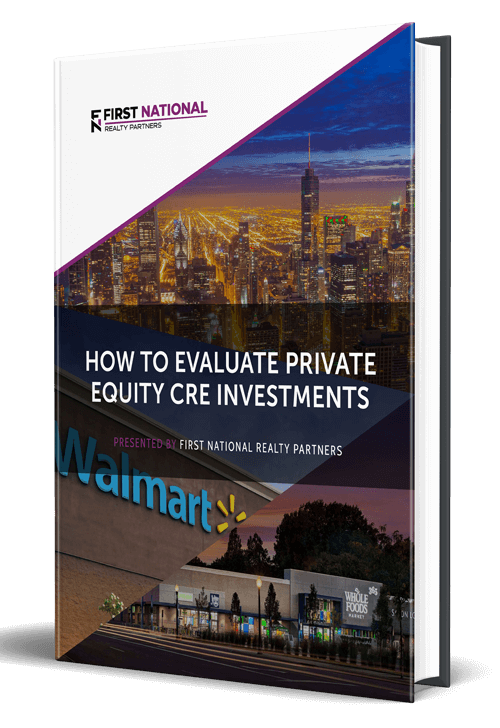There is a common misconception that buying and managing commercial real estate is easy. It isn’t. To be done correctly, a significant amount of resources need to be invested in the research and analysis of a property’s market and financial statements to ensure the transaction meets acceptable risk guidelines.
For an individual considering an investment in a private commercial real estate transaction, analysis of the sponsor is as important as the property itself. The “sponsor” is the individual or company responsible for identifying, underwriting, and managing the property, and there are four elements to look for in a good one. If one or more of them are missing, it may be a sign that the deal should be avoided.
In this article, we’ll explain the four elements a CRE investor should look for in a sponsor, including potential red flags and how to investigate them.
1. Experience
Every real estate transaction is slightly different. Each one has its own set of quirks and it takes years of experience and dozens of repetitions to become familiar with how to overcome the obstacles they can create. A strong transaction sponsor is led by a team of real estate professionals that have a significant amount of investment experience, both individually and collectively. This base of knowledge works to ensure that their investment decision was made thoughtfully, deliberately, and in the best interest of their investors.
Potential Red Flags
If a sponsor does not have a multi-year track record of success, a disciplined investment analysis process, or an investment approval committee, it may be a sign that they are inexperienced. While an experienced sponsor can make a mistake, it is that same experience that can overcome it.
How to Investigate It
When working with a sponsor on a potential investment, ask them how long they’ve been in business, who is responsible for the ultimate investment approval, and for the details of their due diligence process.
2. Transparency
Many private CRE deals are structured so that there is a “General Partner” – who is responsible for finding, analyzing, and managing the property – and a “Limited Partner” who has a strictly passive role. In this structure, the Limited Partner relies on the General Partner’s statements and representations about the investment opportunity and its performance. To make this structure work, trust is critical, and transparency goes a long way towards building it.
Potential Red Flags
If the General Partner does not supply potential investors with detailed investment memos, information about fees, the property’s business plan, or the assumptions that went into their analysis, it may be a sign that they are not being completely transparent. All private commercial real estate investments carry risk and the sponsor should be transparent about what they are and how they plan to mitigate them.
How to Investigate It
A private CRE deal should come with two important documents, the business plan and the Private Placement Memorandum. Between the two, the risks, fees, return structure, and financial projections should be very clearly described. Read them, perform independent analysis, and look for these specific elements to ensure that the sponsor is being transparent.
3. Expertise
Broadly, there are four commercial real estate asset classes: Retail, Office, Industrial, and Multifamily. While they all fall into the category of “real estate,” they require vastly different approaches to underwriting and management. For example, underwriting an industrial property requires specific knowledge about logistics, loading docks, proximity to highways, ports, train stations, and airports while underwriting a retail property requires specific knowledge about traffic counts, market trends, ingress/egress, signage, and median household incomes. A strong transaction sponsor has specific expertise in one asset class and concentrates their resources on finding, buying, and operating it.
Potential Red Flags
If the sponsor’s real estate portfolio is filled with properties of all asset classes, it may be a sign that their focus is too broad to have deep expertise with any one of them. It doesn’t necessarily make them a bad sponsor; it just means that they may not have the truly deep expertise to understand all the nuances of each class. The exception to this rule is an extremely large real estate company that has multiple “divisions”, each of which concentrate on specific asset classes.
How to Investigate It
Ask the sponsor for information on their portfolio or look on their website to see if it is listed. If there are offices, warehouses, apartments, and strip malls, it may necessitate a further conversation about their expertise in any one of them. For example, we focus on a very specific type of asset, grocery store anchored shopping centers. We know everything about them, we’ve developed a specific process for evaluating them, and we feel confident in our ability to manage them. This expertise gives us deep insight into their risks and the strategies we need to mitigate them. This improves the odds of a successful outcome.
4. Incentive Alignment
The financial incentives of the sponsor should be aligned with those of the investor for the duration of the investment. This often takes the form of a “waterfall” return structure where the sponsor only benefits once the investors have earned a “preferred” return. As the return gets higher, the sponsor’s share of the profits may rise so both groups benefit.
Potential Red Flags
If the sponsor charges excessive fees, does not invest their own money, or structures the return so that they benefit regardless of performance, it is likely a sign that their financial incentives are not aligned with those of the investors. For example, if a sponsor charges an excessive amount of fees, they will collect the fees no matter what and does not have a strong incentive to manage the property profitably.
How to Investigate It
This is another place where a close examination of the Private Placement Memorandum is warranted. If the return structure does not align the incentives of the sponsor and investor, a conversation may be needed to clarify how the transaction will work. It may even require walking away from the deal if the return structure is uneven.
Interested in Learning More?
First National Realty Partners is one of the country’s leading private equity commercial real estate investment firms. With an intentional focus on finding world-class, multi-tenanted assets well below intrinsic value, we seek to create superior long-term, risk-adjusted returns for our investors while creating strong economic assets for the communities we invest in.
Whether you’re just getting started or searching for ways to diversify your portfolio, we’re here to help. If you’d like to learn more about our investment opportunities, contact us at (800) 605-4966 or info@fnrpusa.com for more information.






